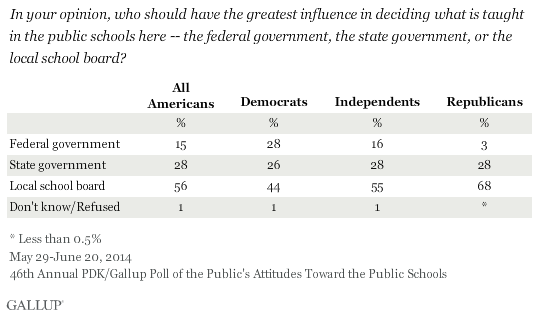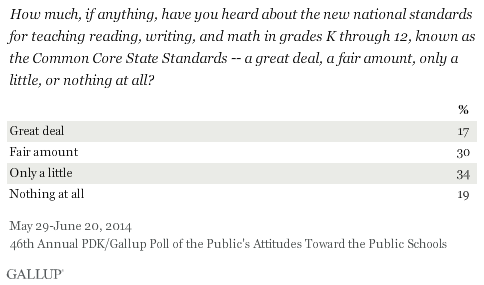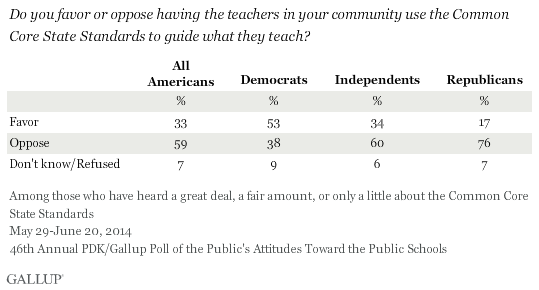WASHINGTON, D.C. -- Americans' trust in U.S. leaders has slipped amid partisan gridlock that has led to federal government inaction on pressing issues at home and abroad. Americans' weak confidence in the federal government extends to issues surrounding public education.
When asked to reflect on who should have the greatest influence on what is taught in the public schools, Americans prefer local school boards over the federal government by a wide margin, 56% to 15%. Twenty-eight percent believe state government should have the greatest say on curriculum.

While about nine times as many Democrats as Republicans say the federal government should have the greatest influence, the local school board is still the most popular choice among Democrats.
These findings are from the 46th Annual PDK/Gallup Poll of the Public's Attitudes Toward the Public Schools. Results are based on a Gallup Panel telephone study of 1,001 adults, aged 18 and older, conducted from May 29-June 20, 2014.
Majority of Americans Oppose Common Core to Guide Teaching
Common Core is one of the dominant topics in American public education this decade. About eight in 10 Americans say they have heard at least a little about the Common Core State Standards. Of those, the majority oppose using the standards in their community to guide teaching. Those who report they know "a great deal" about the Common Core are somewhat less likely to favor them (24%) than those who only know a little (39%).

Majority opposition to the use of the Common Core State Standards to guide instruction persists across age, income, and education levels, but opinion diverges by political affiliation. Republicans who have heard of Common Core are twice as likely as Democrats to oppose use of the standards to guide teaching.

Results from the Gallup Daily tracking survey earlier this year show that 52% of public school parents who had heard at least a little about the Common Core Standards were somewhat or very positive about them. The PDK/Gallup poll item is somewhat more specific, but results show that only about one in three (32%) public school parents favor having teachers in their community use the Common Core Standards to guide what they teach.
Common Core Limits Teachers, Opponents Say
Respondents who oppose having the teachers in their community use the Common Core were given four reasons they might oppose them. About two-thirds (65%) say a very important reason is that it will limit the flexibility teachers have to teach what they think is best.
Though the Common Core State Standards were developed by the National Governors Association, it is possible that Americans associate the initiative with the federal government because of support from the Department of Education and President Barack Obama. Despite declining trust in federal agencies and government generally, federal involvement with the Common Core State Standards does not emerge as a chief reason for opposition among the few that were proposed in this study. Just four in 10 opponents say the fact that the federal government originated the Common Core State Standards Initiative is a very important reason that they oppose them.
![Would you say that each of the following is a very important, somewhat important, not very important, or a not at all important reason that you oppose the use of the Common Core State Standards to guide what teachers in your community teach? How about [ITEMS ROTATED]? 2014 PDK/Gallup poll](http://content.gallup.com/origin/gallupinc/GallupSpaces/Production/Cms/POLL/hpwxtp81vugpxn1kbeydaw.png)
Common Core Is Important for Education Equity, Supporters Say
Those who favor use of the Common Core to guide teachers are most enthusiastic about the opportunity for education equity that the standards may afford. Three in four say a very important reason they favor the standards is that they will help students learn regardless of where they go to school.
![Would you say that each of the following is a very important, somewhat important, not very important, or a not at all important reason that you favor the use of the Common Core State Standards to guide what teachers in your community teach? How about [ITEMS ROTATED]? 2014 PDK/Gallup poll](http://content.gallup.com/origin/gallupinc/GallupSpaces/Production/Cms/POLL/0a3yz-uw6uux_gxlaseaxq.png)
Implications
Americans are generally distrusting of the federal government these days, and this suspicion colors opinions concerning its involvement in public education as well. This is consistent with studies that show Americans' generally higher trust in local over national government, and the results align with the last time this question was asked on the PDK/Gallup poll.
The majority of those who have heard about the Common Core State Standards oppose their use to guide teaching, though opinions on this question are clearly divided along political party lines. While the Common Core Standards are not a federal initiative per se, Americans may see the program as overreaching. Those who oppose the standards for guiding teaching value teacher flexibility and perceive the standards as a threat to teachers' autonomy in the classroom; and those who favor the Common Core see a framework for teaching that could address the well-documented achievement gap, increase rigor in lagging schools, and set students on equal footing with those in higher-achieving schools.
The jury is out about whether the initiative is making a positive impact on student learning. Meanwhile, education agencies need to better articulate how the Common Core standards align with the purpose and plan to help all students learn what they need to know to be successful in college, career, and life.
Survey Methods
Results are based on a Gallup Panel telephone study completed by 1,001 national adults, aged 18 and older, conducted May 29-June 20, 2014. All interviews were conducted in English. The Gallup Panel is a probability-based longitudinal panel of more than 60,000 U.S. adults that are selected using random-digit-dial (RDD) phone interviews that cover landline and cellphones. Address-based sampling methods are also used to recruit panel members. The Gallup Panel is not an opt-in panel and members are not given incentives for participating. The sample for this study was weighted to be demographically representative of the U.S. adult population, using 2013 Current Population Survey figures. For results based on this sample, one can say that the maximum margin of sampling error is ±4.6 percentage points at the 95% confidence level. The margin of error accounts for the design effect from weighting. Margins of error are higher for subsamples.
In addition to sampling error, question wording and practical difficulties in conducting survey can introduce error and bias into the findings of public opinion polls.
For more details on Gallup's polling methodology, visit www.gallup.com.
